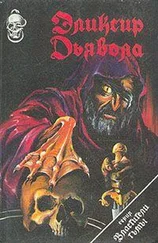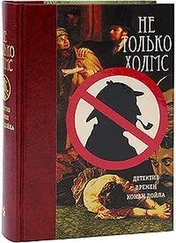"You mean you'd strip— me !" she stammered, scarlet to her hair.
"That's what I mean, you lying little thief. That's just what I mean. Kick and squall as you like, I'll take those papers with me if I have to take your clothing too!"
Breathless, infuriated, she looked desperately around her, caught sight of the Kurdish dagger, leaped at it; and for the third time found herself struggling in his arms.
"Don't!" she gasped. "Let me go! I—I'll give you what you want―"
"Do you mean it?"
"Yes."
He released the dishevelled girl, who shrank away from him. But the devil himself glowed in her black eyes.
"Go out of the room," she said, "if I'm to get the papers for you!"
"I can't trust you," he answered. "I'll turn my back." And he walked over to the olive–wood box, where the weapons lay.
Standing there he heard, presently, the rustle of crumpling papers, heard a half–smothered sob, waited, listening, alert for further treachery on her part.
"Hurry!" he said.
A board creaked.
"Don't move again!" he cried. The floor boards creaked once more; and he turned like a flash to find her in her stocking feet, already halfway to where he stood. In either hand she held out a bundle of papers; and, as they faced each other, she took another step toward him.
"Stand where you are," he warned her. "Throw those papers on the floor!"
"I―"
"Do you hear!"
Looking him straight in the eyes she opened both hands; the papers fell at her feet, and with them dropped the two dagger–like steel pins which had held her hat.
"Now, go and put on your shoes," he said contemptuously, picking up the papers and running over them. When he had counted them, he came back to where she was standing.
"Where are the others?"
"What others?"
"The remainder of the papers! You little devil, they're wrapped around your body! Go into that pantry! Go quick! Undress and throw out every rag you wear!"
She drew a deep, quivering breath, turned, entered the pantry and closed the door. Presently the door opened a little and her clothing dropped outside in a heap.
There were papers in her stockings, papers stitched to her stays, basted inside her skirts. A roll of drawings traced on linen lay on the floor, still retaining the warmth of her body around which they had been wrapped.
He pulled the faded embroidered cover from the old piano and knocked at the pantry door.
"Put that on," he said, "and come out."
She emerged, swathed from ankle to chin, her flushed face shadowed by her fallen mass of dark hair. He turned his flash light on the cupboard, but discovered nothing more. Then he picked up her hat, clothes, and shoes, laid them on the pantry shelf, and curtly bade her go back and dress.
"May I have the lamp and that looking glass?"
"If you like," he said, preoccupied with the papers.
While she was dressing, he repacked the olive–wood box. She emerged presently, carrying the lamp, and he took it from her hurriedly, not knowing whether she might elect to throw it at his head.
While she was putting on her jacket he stood watching her with perplexed and sombre gaze.
"I think," he remarked, "that I'll take you with me and drop you at the Orangeville jail on my way to town. Be kind enough to start toward the door."
As she evinced no inclination to stir he passed one arm around her and lifted her along a few feet; and she turned on him, struggling, her face convulsed with fury.
"Keep your insolent hands off me," she said. "Do you hear?"
"Oh, yes, I hear." He nodded again toward the door. "Come," he repeated impatiently; "move on!"
She hesitated; he picked up the olive–wood box, extinguished the lamp, opened his flash, and motioned with his head, significantly. She walked ahead of him, face lowered.
Outside he closed and locked the door of the house.
"This way," he said coldly. "If you refuse, I'll pick you up and carry you under my arm. I think by this time you realise I can do it, too."
Halfway across the dark pasture she stopped short in her tracks.
"Have I got to carry you?" he demanded sharply.
"Don't have me locked up."
"Why not?"
"I'm not a—a thief."
"Oh! Excuse me. What are you?"
"You know. Don't humiliate me."
"Answer my question! What are you if you're not a lady crook?"
"I'm employed—as you are! Play the game fairly." She halted in the dark pasture, but he motioned her to go forward.
"If you don't keep on walking," he said, "I'll pick you up as I would a pet cat and carry you. Now, then, once more, who are you working for? By whom are you employed, if you're not a plain thief?"
"The—Turkish Embassy."
"What!"
"You knew it," she said in a low voice, walking through the darkness beside him.
"What is your name?" he insisted.
"Dumont."
"What else?"
"Ilse Dumont."
"That's French."
"It's Alsatian German."
"All right. Now, why did you break into that house?"
"To take what you took."
"To steal these papers for the Turkish Embassy?"
"To take them."
"For the Turkish Ambassador!" he repeated incredulously.
"No; for his military attaché."
"What are you, a spy?"
"You knew it well enough. You are one, also. But you have treated me as though I were a thief. You'll be killed for it, I hope."
"You think I'm a spy?" he asked, astonished.
"What else are you?"
"A spy?" he repeated. "Is that what you are? And you suppose me to be one, too? That's funny. That's extremely―" He checked himself, looked around at her. "What are you about?" he demanded. "What's that in your hand?"
"A cigarette."
They had arrived at the road. He got over the wall with the box; she vaulted it lightly.
In the darkness he caught the low, steady throbbing of his engine, and presently distinguished the car standing where he had left it.
"Get in," he said briefly.
"I am not a thief! Are you going to lay that charge against me?"
"I don't know. Is it worse than charging you with three separate attempts to murder me?"
"Are you going to take me to jail?"
"I'll see. You'll go as far as Orangeville with me, anyhow."
"I don't care to go."
"I don't care whether you want to go or not. Get into the car!"
She climbed to the seat beside the wheel; he tossed in the olive–wood box, turned on his lamps, and took the wheel.
"May I have a match for my cigarette?" she asked meekly.
He found one, scratched it; she placed a very thick and long cigarette between her lips and he lighted it for her.
Just as he threw in the clutch and the car started, the girl blew a shower of sparks from the end of her cigarette, rose in her seat, and flung the lighted cigarette high into the air. Instantly it burst into a flare of crimson fire, hanging aloft as though it were a fire balloon, and lighting up road and creek and bushes and fields with a brilliant strontium glare.
Then, far in the night, he heard a motor horn screech three times.
"You young devil!" he said, increasing the speed. "I ought to have remembered that every snake has its mate…. If you offer to touch me—if you move—if you as much as lift a finger, I'll throw you into the creek!"
The car was flying now, reeling over the dirt road like a drunken thing. He hung grimly to the wheel, his strained gaze fixed on the shaft of light ahead, through which the road streamed like a torrent.
A great wind roared in his ears; his cap was gone. The car hurled itself forward through an endless tunnel of darkness lined with silver. Presently he began to slow down; the furious wind died away; the streaking darkness sped by less swiftly.
"Have you gone mad?" she cried in his ear. "You'll kill us both!"
Читать дальше












